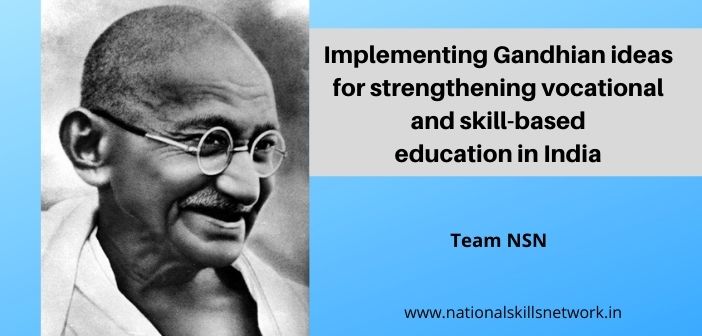“I would revolutionize college education and relate it to national necessities. There would be degrees for mechanical and other engineers. They would be attached to the different industries which should pay for the training of the graduates they need” – M. K. Gandhi
From the above quote, we can understand how foresighted was Mahatma Gandhi when it comes to his thoughts on education. His ideas and thoughts are relevant even in the modern and contemporary world. In this article let us explore how to implement Gandhian ideas for strengthening vocational and skill-based education in India.
 Implementing Gandhian ideas for strengthening vocational and skill-based education in India
Implementing Gandhian ideas for strengthening vocational and skill-based education in India
- Education – Head, Heart, and Hand: For Mahatma Gandhi, education is not just about the head but also about the heart and hand. When we talk about skills or crafts, it is not always the traditional art that we talk about but also contemporizing them with the help of technology
- Implications for schools and colleges: We need to understand that the needs of schools and colleges in rural areas and urban areas, the vocational and technical training institutes are not the same. Therefore, we should explore and understand the local needs and provide training as per the requirements.
- The local economy, self-employment, and MSME: We need to focus on skilling the local youth for the local needs at the village and district level.
Current concerns with local skill development
- Over-emphasis on mobilization for training
- Issues like drop-outs and attrition
- Lack of choice to meet youth aspirations
- Not linked to the local economy and employment
- Unable to promote the dignity of work
Crafts-centric education
Handicrafts should be taught “not merely for production work but for developing intellect of the pupils.” Gandhiji’s concept of basic education that included manual work as a means to make education inclusive. He strongly believed in a holistic curriculum, even in primary education that introduces children to work-experience through agriculture, weaving, carpentry, and several other skills. This would help in balancing the danger of making education over-academic or bookish and influence mindsets positively towards respect for work and dignity of skills and labor.
Craft-centered education creates a balance between theory and monotonous learning through creative stimulation and self-expression. It helps in reducing discrimination between manual and intellectual skills and overcoming prejudices through respect for socially meaningful work that meets the needs of urban and rural Indians. It makes one feel proud about earning a decent livelihood through sustainable sources of income and community initiatives that result in cooperative societies and micro-enterprises.
Related Article: Mahatma Gandhi on the importance of vocational education and skill development – Read More: https://nationalskillsnetwork.in/mahatma-gandhi-on-craft-centric-education/
Breaking stereotypes and conventions in education and skills
We need to break the stereotypes in vocational education that it is meant for low-achievers or dropouts. We must keep aside this jargon and break these conventions around education and skills in India. We must expose children to manual work from a young age, this will help in changing the mindsets and gives the well-deserved respect for the local crafts and expertise. We should also use technology to modernize these crafts.
We hope our points on Implementing Gandhian ideas for strengthening vocational and skill-based education in India would help schools, colleges, and TVET institutions in adopting these ideas and thoughts and contemporize them for the current needs of education.













Comments 2